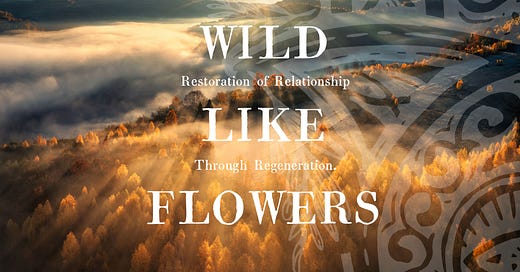Wild Like Flowers, Chapter 2: To be Daybreak
"That is another funny thing about life—it is often right where you are. Yes, life’s ordinariness is its most surprising characteristic. Daybreak’s preamble taught me that."
This is Chapter 2 of my second book, Wild Like Flowers: The Restoration of Relationship Through Regeneration. You can buy the book here. Or, you can read it here.
Chapter 2
I thought the darkness would not yield,
Glooming the sun-forgotten sky,
'Till pulsing, surging glows revealedA far-off burning,—home or field,
Up flung the light. Oh whence? O why?
I thought forgetfulness had spread
A Lethean gloom athwart one sky,
'Till memory's light crept warmly red
From flame I deemed in ashes dead.Up leapt the light. Oh whence? Oh why?
Ruby Archer
Intense darkness is daybreak’s preamble. It is also the best part of my day. I wake up every morning at five o’clock. For the next few hours, the house feels empty and everything is perfectly quiet. Everyone is asleep and so are our neighbors and their loud tractors. That is unfair—we have but one neighbor and they do not own a tractor.
In Nelson County, Virginia, atop the James River and below the panoramic canvas of the Blue Ridge Mountains, there is a small city that is thinly populated and notable for nothing. It sits exactly twelve miles distant from two major roads—roads that carry people quickly to where they are going. But our roads are small and carry us unhurriedly, for we do not want to go anywhere. Our forgotten town is named after the first Indigenous chief confronted by English settlers in North America. But this chief was not from this area or even Virginia at all—he was from North Carolina.
At the time of this writing, the median age is nearly fifty years old and every ten years the population drops by almost half. Life is good here, although the American Population Census tells a different tale. Growth has never been a good indicator of health. My neighbor is eighty-three and is perfectly happy to see more squirrels today than people, me included. Wingina is perhaps one of the few places left in America with growth that is inversely proportional to modernity’s upward trend, and my neighbor and I are okay with that.
Keep reading with a 7-day free trial
Subscribe to Unshod to keep reading this post and get 7 days of free access to the full post archives.





